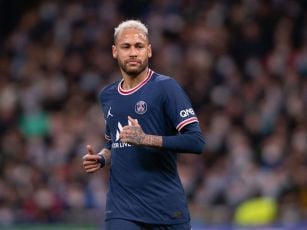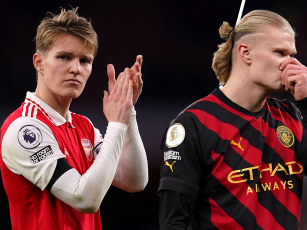The Dutch celebrate a rich and cultured footballing history, stretching back to the early 20th century.
‘Total Football’ has left an enduring legacy on the global game and pioneers like legendary Dutch coach Rinus Michels as well as the incomparable Johan Cruyff, who sadly left us this year, have become icons of the sport.
Failure to qualify for this summer’s European Championships in France has been viewed as an embarrassment - a once global superpower unable to maneuver its way through a group consisting of the Czech Republic, Iceland and Turkey who all finished ahead of the 2010 World Cup runners-up.
Theirs is a team that has hosted some of the finest footballers in Europe over the past 15 years including Robin van Persie, Edwin van der Sar, Arjen Robben and Edgar Davids.
A result like that will be seen as a blemish in an otherwise glowing CV of major tournament appearances, but in many cases the Dutch have been perennial bridesmaids on the world stage.
Resources have not gone untapped, rather unfulfilled potential that has been holding them back and their exit Euro 2000 demonstrates this perfectly.
One can argue that their favourite status in Euro 1992 was perhaps a finer example, or the calibre of squad at the World Cup final in 1978 where Michels had developed a team which he felt could conquer the rest with an all-out attacking focus.
On the whole, the Dutch can count themselves as nearly men of world football.
Beaten World Cup finalists in 1974, 1978 and 2010, they have reached the semifinals at the European Championships three times since they last lifted the trophy in 1988, only to fall before the final on each occasion.

Andres Iniesta scores the winning goal in the World Cup final in 2010 to down the Netherlands. Image: Frank Augstein / AP/Press Association Images
Comparisons to Euro 2000 can be drawn from the Dutch side that competed at Euro 2008 - they were the sensation of the group phase, beating Italy (3-0) and France (4-1) in scintillating fashion, but they went out timidly to Russia in the last eight.
All bark and no bite in the crucial knock-out stages.
The Dutch were co-hosts for the tournament, alongside Belgium, and cities like Amsterdam, Rotterdam, Eindhoven and Arnhem were bracing themselves for a summer of football.
Frank Rijkaard’s side were handed a relatively straightforward draw for the group stages; Czech Republic, Denmark and eventual tournament winners France. Of course, the top two teams would qualify so there was little fear of an early exit from the tournament. It was the swashbuckling manner of their early victories which surprised many.
Things didn’t kick off in such rosey fashion, a last minute Frank de Boer penalty pushed them over the line against the Czech Republic got them off the mark in Amsterdam. That winner was preceded by the Czechs twice hitting the woodwork as well as being reduced to ten men.
“We were very lucky," Frank Rijkaard conceded after the final whistle.
"You can have your doubts," Ron de Boer said afterwards, but Nemec "pulled my shirt, I fell, the ref gave a penalty, and my brother did a great job."
Regardless of the doubts, the Netherlands got the penalty. They scored. They were up and running.
Next came a much more straightforward victory over the Danes. The result was as much emphatic as it was a statement of intent from the team that so many had begun to doubt. Goals from Patrick Kluivert, Ronald de Boer and Boudewijn Zenden guaranteed their quarter-final berth.
"The criticism from Rijkaard before the match was a challenge for us. This showed we can make it as a team” said Kluivert.
The first real test of their mettle came against France. The World Champions had a team which had balanced experience and youth delicately, the spine of the side comprised of captain Marcel Desailly and Patrick Vieira.
Up top, an embarrassment of attacking riches. Nicolas Anelka, Juventus’ David Trezeguet, and Sylvain Wiltord just to name a few who would pose the Oranje problems.
Christophe Dugarry and Patrick Kluivert exchanged early strikes, before Trezeguet restored the French advantage.
Two goals in eight minutes, however, was the hammer blow the Dutch were looking for. Frank de Boer's thunderous free-kick made it 2-2 and the home fans had barely finished celebrating when Zenden put the co-hosts in front, sweeping in Sander Westerveld’s long clearance.
The strike made it three wins from three and a resurgent victory over the world champions sent shockwaves through the competition. While the Dutch needed to manage expectation on their home turf, a first European Championship title in 12 years was a becoming realistic target.
“The Yugoslavs showed in their other match that they can play fighting football with technical skills as well,” Rijkaard told reporters after the game, “They are dangerous opponents for the quarter-finals. In comparison with two years ago when we met them in the World Cup, they are showing a better team spirit, so they are more dangerous than before."
Lip service, perhaps, to a team who they had been rewarded with after a top place finish. A team who they would not fear derail their progress to the semi-finals.
The starting line-up remained much the same, Kluivert, Davids, Zenden all retained their starting berths. Kluivert, aiming for the tournament’s golden boot, took just sixty minutes to fire himself level at the top of the charts after completing his hat-trick in the 54th minute.
A Marc Overmars brace put the gloss on a 6-1 victory for the Dutch and they went into the semi-finals with Italy high on confidence.
The Italians, meanwhile, were not to be underestimated. They also boasted a 100% record in the group stage and victory over Romania in the quarter-final left them in a similarly strong position.
Defensively, they looked secure. A rearguard of Fabio Cannavaro, Alessandro Nesta, Paolo Maldini and Gianluca Zambrotta was enough to frighten the free scoring Dutch (or any team in world football for that matter).
They boasted their own attacking talent In Francesco Totti and Filippo Inzaghi, but they set out to stifle Frank Rijkaard’s men.
On home soil the Netherlands were frustrated. The semi-final was by no means was a classic and the House of Orange failed to burst to life. Kluivert, aiming to become the outright leading goalscorer, was negated masterfully by Nesta. The Guardian’s David Lacey wrote of his determination similar to that of “the single-mindedness of a Mountie”.
In reality, the Dutch simply didn’t take their chances. First Frank de Boer saw his penalty saved in regulation time, before then Kluivert hit the from the spot post, as Dennis Bergkamp had done from open play early in the match.
They had all but dominated the game, with 33 minutes on the clock the Italians were reduced to 10 men when Zambrotta was dismissed for a second bookable offence. The Dutch dominated possession to an almost embarrassing degree, but with no end product.
From the outside, it appeared, they had lost their nerve.
As extra-time began to wind down without any sign of a goal penalties loomed. The two missed efforts from the spot will no doubt have impacted on the Dutch and it showed in their body language.
Frank de Boer was once again unable to beat Francesco Toldo from the spot, his shot to the right of the goal was well saved by the Italian netminder.
Jaap Stam was the next to step up, but his effort was blazed over the bar. Totti was far more composed, the then-23-year-old executed the perfect Panenka penalty.
Kluivert scored to keep the flicker of hope alive and Van Der Sar did all he could to fan the flame when he denied Paolo Maldini.
But it was Paul Bosvelt who failed to convert from the spot and sent the Dutch crashing out of Euros on penalties once again.
Similarly in 1992 they lasted an additional 30 minutes before succumbing on penalties. That disappointment came amid a run of four shootout exits in five major tournaments, the Euro '96 quarter-final defeat included.
Cases like these usually tend to fuel to the next push for silverware, but with the Dutch failing to qualify for this summer’s tournament, it begs the question: Where do they go from here?
Download the brand new OffTheBall App in the Play Store & App Store right now! We've got you covered!
Subscribe to OffTheBall's YouTube channel for more videos, like us on Facebook or follow us on Twitter for the latest sporting news and content.








